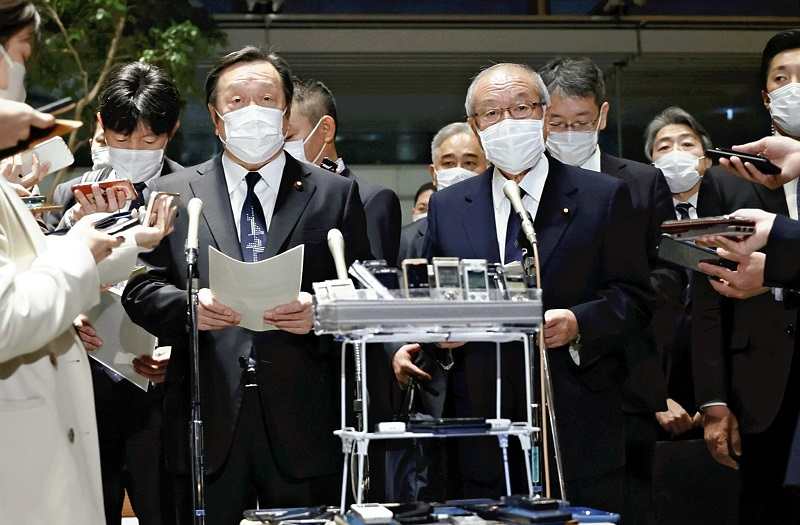
Defense Minister Yasukazu Hamada, left, and Finance Minister Shunichi Suzuki speak to reporters at the Prime Minister’s Office after meeting with Prime Minister Fumio Kishida on Monday afternoon.
15:33 JST, December 6, 2022
Prime Minister Fumio Kishida has instructed his defense and finance ministers to earmark a total of about ¥43 trillion for defense spending under the nation’s Medium Term Defense Program over the five years from fiscal 2023.
During a meeting with Defense Minister Yasukazu Hamada and Finance Minister Shunichi Suzuki on Monday, Kishida also once more expressed his intention to decide within the year on concrete measures to secure the financial resources for such spending in the coming five-year period and beyond.
Hamada revealed Kishida’s instructions to the press after the meeting.
The ¥43 trillion in defense spending will be a significant increase from the about ¥27.47 trillion total for the current five-year midterm defense program from fiscal 2019.
“We’d like to facilitate coordination for securing financial resources, while consulting with the ruling parties with regard to both revenue and spending, including about such matters as expenditure reform, using reserve funds and tax measures,” Suzuki told reporters.
With moves toward strengthening the nation’s defense capabilities reaching their final stage, the government held a National Security Council meeting on Monday that involved the prime minister, defense and foreign ministers, and chief cabinet secretary to discuss the National Security Strategy. The ruling Liberal Democratic Party specified items to be included in the strategy in its own meeting on the day.
Bearing in mind the likelihood that the country will acquire counterattack capabilities, the government intends to include in the strategy the use of “standoff defense capabilities,” which allow missiles to be launched from outside an enemy’s range of defensive fire, and policies to significantly strengthen its maritime security capabilities.
The government also is considering including in the strategy research and development and the building and improvement of social infrastructure that would contribute to the defense of the nation, and the establishment of a framework for “active cyber defense” to prevent serious cyberattacks in advance.
The strategy will also include measures to strengthen the nation’s ability to respond to information warfare in order to deal with fake information, as well as those to ensure military and economic security.
Top Articles in Politics
-

Japan PM Takaichi’s Cabinet Resigns en Masse
-

Sanae Takaichi Elected Prime Minister of Japan; Keeps All Cabinet Appointees from Previous Term
-

Japan’s Govt to Submit Road Map for Growth Strategy in March, PM Takaichi to Announce in Upcoming Policy Speech
-

LDP Wins Historic Landslide Victory
-

LDP Wins Landslide Victory, Secures Single-party Majority; Ruling Coalition with JIP Poised to Secure Over 300 seats (UPDATE 1)
JN ACCESS RANKING
-

Japan PM Takaichi’s Cabinet Resigns en Masse
-

Japan Institute to Use Domestic Commercial Optical Lattice Clock to Set Japan Standard Time
-

Israeli Ambassador to Japan Speaks about Japan’s Role in the Reconstruction of Gaza
-

Man Infected with Measles Reportedly Dined at Restaurant in Tokyo Station
-

Videos Plagiarized, Reposted with False Subtitles Claiming ‘Ryukyu Belongs to China’; Anti-China False Information Also Posted in Japan





















